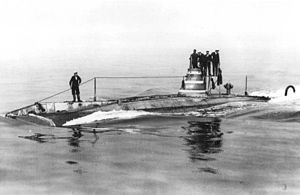HMS A3
This is an old revision of this page, as edited by Nigel Ish (talk | contribs) at 16:04, 15 May 2020 (fix cite). The present address (URL) is a permanent link to this revision, which may differ significantly from the current revision.
 HMS A3
| |
| History | |
|---|---|
| Name | HMS A3 |
| Builder | Vickers, Sons & Maxim Ltd. Barrow-in-Furness, England |
| Laid down | 6 November 1902 |
| Launched | 9 March 1903 |
| Commissioned | 13 July 1904 |
| Fate | Sunk, 12 May 1912 |
| General characteristics | |
| Class and type | Template:Sclass2- submarine |
| Displacement |
|
| Length | 105 ft (32.0 m) |
| Beam | 12 ft 9 in (3.9 m) |
| Draught | 10 ft 8 in (3.3 m) |
| Installed power |
|
| Propulsion |
|
| Speed |
|
| Range | 320 nautical miles (590 km; 370 mi) at 10 kn (19 km/h; 12 mph) surfaced |
| Complement | 2 officers and 9 ratings |
| Armament | 2 × 18-inch (45 cm) torpedo tubes |
HMS A3 was an Template:Sclass2- submarine built for the Royal Navy in the first decade of the 20th century.
Design and description
A3 was a member of the first British class of submarines, although slightly larger, faster and more heavily armed than the lead ship, HMS A1. The submarine had a length of 105 feet 1 inch (32.0 m) overall, a beam of 12 feet 9 inches (3.9 m) and a mean draft of 10 feet 8 inches (3.3 m). They displaced 190 long tons (190 t) on the surface and 206 long tons (209 t) submerged. The A-class submarines had a crew of 2 officers and 11 ratings.[1]
For surface running, the boats were powered by a single 16-cylinder 450-brake-horsepower (336 kW) Wolseley petrol engine that drove one propeller shaft. When submerged the propeller was driven by a 150-horsepower (112 kW) electric motor. They could reach 10 knots (19 km/h; 12 mph) on the surface and 7 knots (13 km/h; 8.1 mph) underwater. On the surface, A3 had a range of 320 nautical miles (590 km; 370 mi) at 10 knots (19 km/h; 12 mph);[1] the boat had a range of 30 nautical miles (56 km; 35 mi) at 5 knots (9.3 km/h; 5.8 mph) submerged.[2][3]
The boats were armed with two 18-inch (45 cm) torpedo tubes in the bow. They could carry a pair of reload torpedoes, but generally did not as doing so that they had to compensate for their weight by an equivalent weight of fuel.
Construction and career
A3 was built at Vickers, Barrow-in-Furness and was commissioned on 13 July 1904. She primarily served as a coastal defense and training submarine in her over seven years of service. On 2 February 1912, A3, along with several other submarines dispatched from the port of Gosport, conducted training exercises on target ships in the Solent.[4] Whilst attacking the depot ship HMS Hazard, the A3 accidentally collided with its target. Its rudder and propeller were both disabled, and the submarine sank with all hands lost.[4] The submarine was risen in March and was sunk as a gunnery target by shells from the HMS St. Vincent on 15 May 1912.[5] In July 2016 the wreck of A3 was officially designated as a protected site.[6]
Notes
- ^ a b Gardiner & Gray 1985, p. 86.
- ^ Akermann 2002, p. 120.
- ^ Harrison, chapter 27
- ^ a b McCartney 2002, p. 77.
- ^ McCartney 2002, p. 78.
- ^ "British A3 submarine sunk off Jurassic Coast in 1912 gets protected status". Dorset Echo. Newsquest Media. 22 July 2016. Retrieved 24 July 2016.
References
- Akermann, Paul (2002). Encyclopaedia of British Submarines 1901–1955 (reprint of the 1989 ed.). Penzance, Cornwall: Periscope Publishing. ISBN 1-904381-05-7.
- Colledge, J. J.; Warlow, Ben (2006) [1969]. Ships of the Royal Navy: The Complete Record of all Fighting Ships of the Royal Navy (Rev. ed.). London: Chatham Publishing. ISBN 978-1-86176-281-8.
- Gardiner, Robert; Gray, Randal, eds. (1985). Conway's All the World's Fighting Ships: 1906–1921. Annapolis, Maryland: Naval Institute Press. ISBN 0-85177-245-5.
{{cite book}}: Unknown parameter|lastauthoramp=ignored (|name-list-style=suggested) (help) - Harrison, A. N. (January 1979). "The Development of HM Submarines From Holland No. 1 (1901) to Porpoise (1930) (BR3043)". Submariners Association: Barrow in Furness Branch. Archived from the original on 19 May 2015. Retrieved 19 August 2015.
- McCartney, Innes (2002). Lost Patrols: Submarine Wrecks of the English Channel. Periscope Publishing Ltd. ISBN 1-904381-04-9.
- Gray, Edwyn (2003). Disasters of the Deep A Comprehensive Survey of Submarine Accidents & Disasters. Leo Cooper. ISBN 0-85052-987-5.
External links
| |
50°31.41′N 2°11.25′W / 50.52350°N 2.18750°W / 50.52350; -2.18750
- A-class submarines (1903)
- British submarine accidents
- Ships built in Barrow-in-Furness
- 1903 ships
- Royal Navy ship names
- Maritime incidents in 1912
- 1912 disasters in the United Kingdom
- Ships sunk in collisions
- Ships lost with all hands
- Ships sunk as targets
- Lost submarines of the United Kingdom
- Shipwrecks in the English Channel
- Wreck diving sites in the United Kingdom
